danbricklin.com/log
|
||
|
|
Starting September 21, 2001
Copy protection robs the future, More about Internet searching as a dominant tool, What's been successful in B2C?, Pictures, Changes to small business essay, How do you do thoughtful discussion post 9/11/01?, Small businesses and web sites essay, Old thoughts on changes
21Sep01-09Oct01
2001_09_21.htm
|
|
Tuesday, October 9, 2001
Copy protection robs the future
I just posted a new essay about copy protection. The bottom line: Copy protection looks to be a major impediment to preserving our cultural heritage. Works that are copy protected are less likely to survive into the future. The formal and informal world of archivists and preservers will be unable to do their job of moving what they keep from one media to another newer one, nor will they be able to ensure survival and appreciation through wide dissemination, even when it is legal to do so.
Read "Copy Protection Robs the Future".
 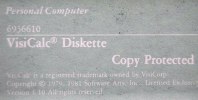 My 35-year old photo of a 2000-year old Dead Sea Scroll and an original IBM PC VisiCalc diskette -- two examples from my essay
Friday, October 5, 2001
More about Internet searching as a dominant tool
In my essay "The Internet is now a dominant tool for regular people", I write about how regular people use Internet searching in lieu of other techniques -- it has become like duct tape: You use it for everything. Richard W. Wiggins has written a fascinating article for First Monday, "The Effects of September 11 on the Leading Search Engine", that gives very precise examples of this. A great article.
He traces the evolution of the terms people searched for, and Google's changes to its home page, starting September 11. For example, he reports that Google listed the top 10 Google queries related to 9/11 after the attack as headed by "cnn", "world trade center", and "bbc". He writes: "Immediately after the attack, some 6000 users per minute used Google to find CNN. Ever since the Gulf War, millions of Americans turn to CNN instinctively in time of crisis or major breaking news. It is interesting to see that that instinct translates to online quests for breaking news. But why would a user point his or her Web browser at Google.com, and do a search engine lookup, in order to find the Web site of the Cable News Network? Why wouldn't the user simply enter 'cnn' or 'cnn.com' into the Address field of their Web browser?" In answering his question, he points out that "...under this interpretation, brand name is at least as important as Web site domain name." In addition to showing how people use search engines, it's great backup to Bob Frankston's argument that we don't need to mix the DNS with trademarks -- people are quite willing to use other directories to find particular web sites.
Thursday, October 4, 2001
What's been successful in B2C?
Another essay: Since I've appeared pretty down on eBusinesses in some of my writings, I decided it was time to talk about what are things that seem to work. I examined some successes. My conclusion? A common theme is a huge, diverse set of items for the person to choose from, where most people want access to the wide list, not just the few most popular with everybody else. Another theme is the ability to inspect items enough to determine which particular item is desired, or providing known commodities (like books) that can be described by title and source/author. Finally, likelihood of success at getting what you want is important. When you compare successful applications to alternatives, you see that being online has clear advantages to the buyer, and not just price.
Read "What's been successful in B2C?".
Pictures
With all my essays and stuff recently, I've neglected to put up any pictures. I know from many readers that the pictures are one of the special things about this web site. Unfortunately, I've been forgetting to take my camera places (and haven't been to too many with general interest). I'll be at the Agenda conference in a few weeks, so hopefully that will change in a while. In the meantime, here are some pictures of the lines at Logan Airport last Sunday at about 6pm (prime time). I was dropping off and picking up, so I got to walk around a bit. While many people I've talked to are sometimes finding check-in times pretty fast at many airports (20 minutes), including Logan, there are some bad times. This was one of them. Considering the waits, people were very nice and friendly, as you see a lot these days. I hope that good sense of community keeps up. We'll need it.
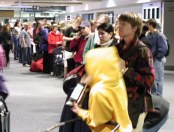 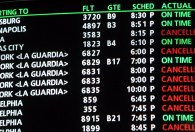 US Airways: 45 minutes or so to check-in with an e-ticket according to a person I asked in line and a short wait for security, but there are fewer flights than normal
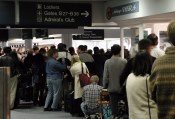 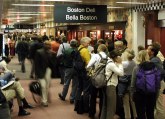 American: An hour and a half to get through security, half hour for check-in they told me
 Delta: An hour and a half at least to check-in, almost as much for security according to some people
Tuesday, October 2, 2001
Changes to small business essay
For those of you who read my Small Business and Web Sites essay: I reposted it with major edits based on feedback this afternoon. It's the same basic message, hopefully even clearer.
Monday, October 1, 2001
How do you do thoughtful discussion post 9/11/01?
I received an email from a reader last week that discussed his thoughts about figuring out what to do post 9/11/01. He did a lot of thinking on his long drive home after the planes stopped flying. As an industrial troubleshooter who works in safety and environmental protection, he deals with designs that can have life and death implications. He can see the difference between designs that were well thought out and those that were not. His main question: How do we carry out the discussions that need to happen post 9/11?
His comments and my attempt at a response are on a separate page. Read: "How Do You Do Thoughtful Discussion Post 9/11/01?".
My main suggestion is to make use of personal web logs and web sites, much like our founding fathers used pamphlets. (See my "Pamphleteers and Web Sites" essay from last spring to learn more about pamphlets during the 1700's.) Some mechanism needs to be put in place, though, to make sure that lawmakers and other decision makers are in the loop and read what others have to say, too. My conclusion: I think reading, thinking, writing, and linking are things that can help this country, and the world, move forward. It takes lots of time, but it worked for our founding fathers and I hope it will work now.
Tuesday, September 25, 2001
Small businesses and web sites essay
The company I founded and for which I work, Trellix Corporation, produces web site creation systems that are used by regular people to create web sites for individuals and small businesses. Lately, the small business web site market has shown continued good growth in contrast to many other areas of the business use of the Internet. As part of my preparation for press and customer meetings, and to help in product development, I've done some research and thinking about the small business area. Over the last few months, when I shared some of it with members of the press and analysts, they found it eye opening and helpful. I decided to present some of that information here on my web site as background for future meetings with the press and as something interesting for my readers. A companion web page has annotated links to some of the raw data I used.
Here's what I cover: Many people have been asserting that all small businesses should and will become eBusinesses or, conversely, that there is no money to be made selling web sites to them. My essay examines why those assertions are mistaken, surveys the vast variety of businesses to show how few do things that fit the "Amazon" model yet how huge the market is in general, and then shows how the cost of Internet uses such as basic web sites fits well within the marketing budget of most small businesses.
Read "Small Business and Web Sites".
Friday, September 21, 2001
Old thoughts on changes
In the wake of the awful things in NYC, Washington, and Pennsylvania, there is a feeling that things will change here in the US. People are rethinking security, tall buildings, downtowns, travel, and communications, and finding new meaning in life and relationships. It's a scary time, with the future unclear as people rush to do "something". As I've heard from various people who ditched their air tickets and drove for days to get home, we are a country of people who feel better when we're doing something to move at least generally in the direction we want to go. Feeling like we are doing nothing is very frustrating and against our nature. Of course, we are also a country founded by brilliant, thoughtful people who debated for long periods of time to finally come up with the document that has guided us for so many years, the US Constitution and its Bill of Rights. They moved ahead, but they took the time and effort to put lots of thought into it, and that time was well spent.
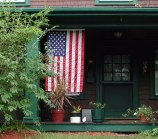  People want to say something, to do something. Many put flags on their houses (and web sites) to say that they have strong feelings of community with others in the country that they love.
On the topic of cities and large buildings, a book that I've seen mentioned in the press with regards to rebuilding in NYC is one I've been quoting from for the last few months: Jane Jacobs' The Death and Life of Great American Cities. It's a classic book, written in 1961. It examines in great detail how neighborhoods and city blocks work or don't work to serve the people who live and work there, how government subsidies help and don't help, and how our belief in stifling utopias clouded city planning. Much of it is based on personal observation and interviews, with an eye for what really motivates people to do the things they do. I originally read it as background for thoughts about issues of community and security on the Internet. The parts of the book that many people point to relate to the dynamic culture of a city street, and the role of sidewalks, shopkeepers, passers by, and "self-appointed public characters" in privacy, security, and information dissemination. I found that reading the whole book through (not something everybody who read it in school did, I understand...) was worthwhile. As we debate the systems we are putting in place, both physical and virtual, it's worth looking back at her thinking and methodology.
On the topic of changes, two songs from my youth (and the youth of many decision makers in business and government) come to mind. They have two different attitudes, reminding us not to get caught up in any given one.
The first song is Bob Dylan's The Times They Are A-Changin'. It has a very brash, in-your-face, "get with it or get out" attitude. "Then you better start swimmin' / Or you'll sink like a stone / For the times they are a-changin'."
The second song is Phil Ochs' Changes. It has a much warmer, but more fateful attitude. "Sit by my side, come as close as the air...one last cup of wine we will pour." It speaks of losing the old times and that change is inevitable. To me, one line had images of September 11th: "Moments of magic will glow in the night / All fears of the forest are gone / But when the morning breaks they're swept away by / golden drops of dawn, of changes."
Like Phil Ochs, we loved those secure old times, but knew they couldn't last forever. Like Bob Dylan, we're going to take on with excitement the challenge of building the new. Hopefully we'll successfully balance between "...don't speak too soon / For the wheel's still in spin" and "For he that gets hurt / Will be he who has stalled" in a "...universe ablaze with changes." And as Jane Jacobs' writing teaches in these post-bubble times, we should look deeply at what real people do in their interconnected lives with real feelings, and not just believe in simple generalities and hope it works out.
|
||
|
© Copyright 1999-2018 by Daniel Bricklin
All Rights Reserved.
|
||